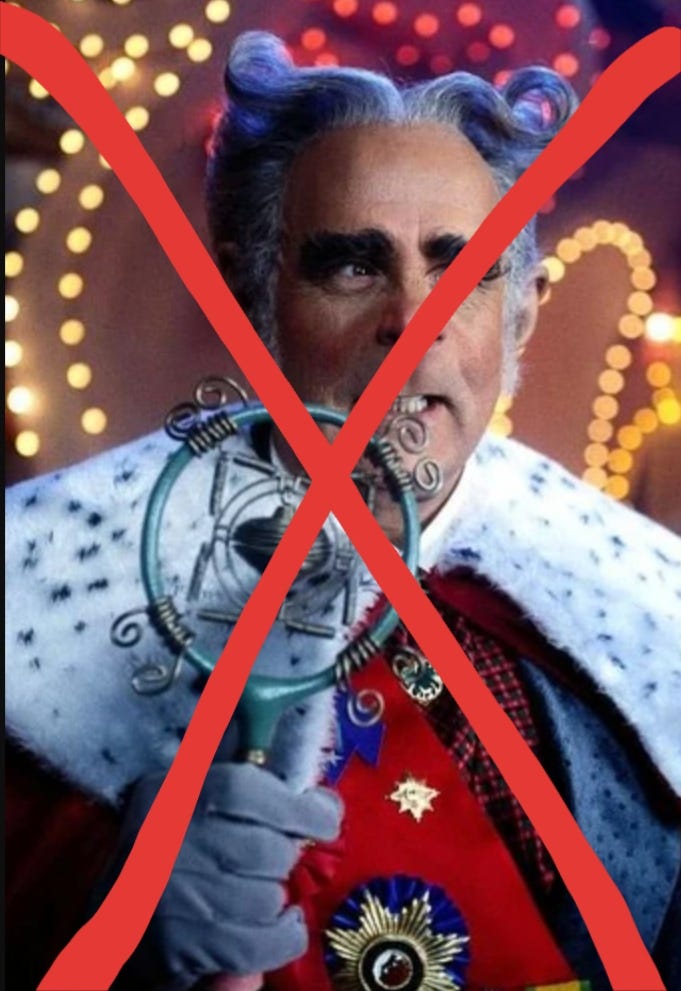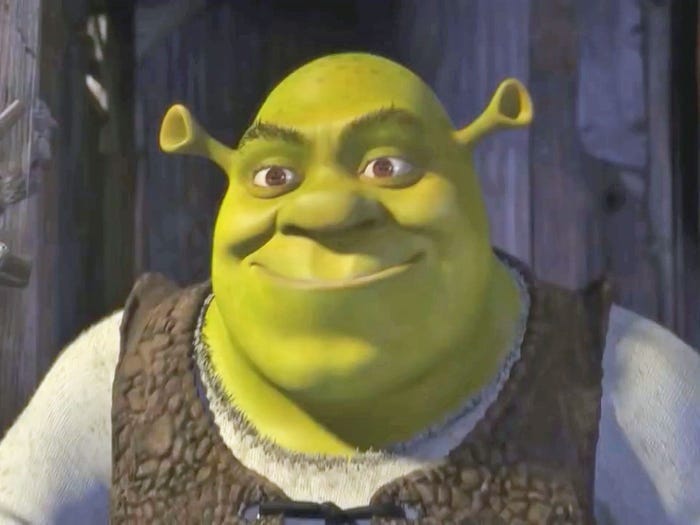A friend sent me this tweet the other day:
This opened quite the can of worms. We got into it, furiously exchanging increasingly long voice notes about the Seussian universe. Critical Grinch theory was happening in the chat.
As I went down this rabbit hole, I discovered I had more questions than answers. After hours of research about the oppressiveness of Who society, the cultural institution of Christmas, the politics of the body, and whether or not we thought the children’s book character was hot, I had a blinding revelation: this is an unequivocally queer story.
REFERENCE MATERIAL
To better understand the Grinch, I had to educate myself on Grinch lore. I reference the original 1957 book How the Grinch Stole Christmas! by Dr. Seuss, the animated TV special How the Grinch Stole Christmas (1966), and the live-action adaptation How the Grinch Stole Christmas (2000). I do not accept the animated adaptation The Grinch (2018) as canon because it kinda sucks and does not introduce any novel ideas.
GRINCH LORE
According to the Seuss Fandom Wiki, unlike the Whos, the Grinch is a different species entirely, known as a What.
Like, that couldn’t possibly be more on the nose. With this classification, the Grinch is not only othered, but dehumanized, reduced to a something rather than a someone.
Labels are powerful tools, and they have always used by the ruling elite to shape narratives in their favor—the winners write the history books, after all. Assuming that Who scientists / historians were the ones doing the naming, calling the Grinch a What was wholly intentional and has absolutely horrific implications. Cartoonish levels of evil going on here.
Back to the Grinch, specifically the 2000 live action portrayal. As a baby, he blew into Whoville by mistake one Christmas Eve and fell under the care of two female Whos (lesbian moms!!) The Grinch demonstrates anti-Christmas behaviors from infancy, such as biting he head off of a ceramic Santa and drawing him & his reindeer perishing in hellfire. This implies that the Grinch’s hatred of the holiday (and, conversely, the Whos’s adoration of it) is somehow a biological trait, and isn’t brought on via socialization.
The Grinch’s contempt for Christmas comes to a head when he is ridiculed by his Who classmates at a school Christmas party, where he is singled out for his different appearance—a experience common with young queer people. He responds by wrecking the classroom and ruining the party. Ever since this Christmas party snafu, the Grinch has lived in self-imposed isolation on Mt. Crumpit, scaring off any Whos who might venture up from Whoville to bother him.
Jim Carrey’s performance of the Grinch is a colorful interpretation of an otherwise one-note character: he’s flamboyant, quick-witted, and a bit of a diva, yet self-deprecating with a masochistic streak, all which are consistent with stereotypical portrayals of queerness in popular media.
“WHO” ARE THE REAL ENEMIES?
We cannot begin to discuss the Grinch without mentioning his adversaries: those wretched little asswipes known as the Whos.
Not much is known about Whos other than their ardent love for Christmas. Their shitty little lives seem to revolve around the holiday: they play with their obnoxious new toys, feast like gluttons, and carol incessantly. The religious tendencies of the Whos are not explicitly stated, and I don’t want to wax theological about the implications of there being a Christmas in this world (the existence of a Who-Christ etc.) All you need to know is that the Whos are such staunch defenders of their Christmas tradition that they will ridicule, ostracize, and enact violence upon anyone who does not share their enthusiasm for the holiday, with the Grinch bearing the brunt of their ire.
In the live action, the slimeball mayor challenges Cindy Lou Who’s idea that the Grinch was eligible to be crowned “holiday cheermeister” by cherrypicking exclusionary verses from the Book of Who, such as “the term grinchy shall apply when Christmas spirit is in short supply.” As to whether this is a religious text or a codification of Who law, one cannot say (not that there is any apparent separation) but regardless, this decree exists to exclude the Grinch by name, positioning him or anyone like him as a common enemy that all Whos are to fight against. One could even surmise that the Whos use “Grinch” and “grinchy” as slurs.
At one point, this sniveling despot of a mayor completely fabricates a passage to further support his anti-Grinch agenda, a blatant display of Who-nationalist sentiment. There is nothing so dastardly as punishing someone for what they do or or not love.

This notion is eerily reminiscent of the “war on Christmas” that bible-thumpers love to bemoan—the horror of Happy Holidays! the tragedy of Christmas trees getting unduly replaced with secular snowflakes on chain-establishment coffee cups!—and out of which soulless ghouls like Bill O’Reilly and Pat Robertson have been making careers since ‘04. In the words of Fox News shill John Gibson:
“The Christians are coming to retake their place in the public square, and the most natural battleground in this war is Christmas."
Still not convinced? Consider the title of the story. The notion that the Grinch “stole” Christmas implies that 1) Christmas belongs to someone, 2) this someone is not the Grinch, and 3) Christmas is something that can be stolen in the first place. If this isn’t a direct parallel to the Christian right’s belief that the “woke left” is “stealing their holiday,” then I don’t know what is.
SCENTS AND SENSIBILITY
Consider the lyrics to the 1966 animated adaptation “You’re a Mean One, Mr. Grinch.”
The Grinch’s moral bankruptcy is, interestingly enough, communicated mainly through smell. With comparisons to rotting bananas, moldy tomatoes, skunks, unwashed socks, and straight-up dumpsters, there are plenty of opportunity to talk smell politics here. In the live action, when describing how terrible the Grinch is, the Whos repeatedly mention that he is “stinky,” thereby equating unpleasant smells with his perceived wickedness.
In her thesis “Olfactory Ethics: The Politics of Smell in Modern and Contemporary Prose,” Dr. Ally Louks describes how olfactory disgust can result in a person’s rejection:
“…smell very often invokes identity in a way that signifies an individual’s worth and status in an inarguable manner that short-circuits conscious reflection.”
But here’s the real kicker: in the live action, the Whoville sanitation department seems to consist of a chute labeled “Dumpit to Crumpit” into which all Whoville’s trash is funneled directly next to the Grinch’s house. To dump garbage directly on top of the Grinch and in the same breath hold him in derision for being stinky is downright insidious behavior. From this, we can even assume that the Grinch is a victim of environmental racism.
The insertion of unpleasant imagery into the Grinch’s anatomy—“a brain full of spiders, a soul filled with garlic / gunk”—once again centers the Whos’s disgust around his physical body. When examining the Grinch’s oppression through this lens of physicality, we can draw a parallel to our heteronormative society’s policing of queer bodies.
IT AIN’T EASY BEING GREEN
Unlike the Whos, who are small, thoroughly humanoid, and whimsically dressed, the Grinch is beastly: large, ugly, and green.
I was shocked to learn that the Grinch was not originally green. How the Grinch Stole Christmas! was originally illustrated in black, white, and red, and the Grinch’s green coloring was only introduced in the 1966 animated adaptation (animator Chuck Jones was allegedly inspired to make this choice by the color of rental car he was driving at the time, which was an unsightly pea-soup green.)
This coloring choice suits the Grinch exceedingly well. Green is sickly. Green is envious. Green is brat.
In media, green coloring has often been used as an indicator of evilness: think the Wicked Witch of the West (Elphaba,) the Riddler, and “the mean green mother from outer space” themselves, Audrey II. But there is only one character that can truly rival he Grinch in terms of color, size, and marginalization:
YES! Much like the Grinch, Shrek is a broody, curmudgeon, stinky loner who is feared and hated by all who know him.
For both Shrek and the Grinch, their appearances are not just unfortunate personal circumstances, but are the reasons for the overtly political motives behind their discrimination: they both harbor vendettas against the oppressive societies that chased them to the literal edges of civilization, continue to isolate themselves out of the belief that they are intrinsically unfit to be loved, & uphold their monstrous reputations as a defense mechanism. And why wouldn’t you? When you’re told your whole life that you’re a monster, you can’t help but start to believe that you are, a searing parallel to queer self-hatred.
It’s also important to note that (like Shrek) the Grinch is not an instigator. In the live action, he only ever descends from his home on Mt. Crumpit to start sowing discord in Whoville because some teenaged punks trespassed on his property, which is a perfectly reasonable response from someone who desperately wants to preserve his peace and avoid further harm at the hands of his oppressors.
WHAT’S IN A NAME
In the 2000 live action, the Grinch seems to use “Grinch” as his government name:
This struck me as odd; until this point, I had rarely seen him referred to as anything but the Grinch. The inclusion of an article THE dehumanizes and in a way mythologizes the Grinch, a la THE Boogeyman or THE Loch Ness Monster.
The Whos have fairly typical humanoid names—Cindy Lou, Augustus, Martha—so the name “Grinch” is sorely out of place in Who society. The Grinch’s lesbian moms naming him “Grinch” is the Who equivalent of naming your kid, like, Throckmorton: cruel and unusual.
Similarly, Shrek is not known by his name, and is instead is solely referred to as “the ogre” or even “it” by Duloc’s subjects (talk about dehumanizing!) It’s often theorized that Shrek didn’t even have a name until Donkey came along and asked what it was; due to his life of isolation, he wouldn’t have even needed one.
The depersonalization of the Grinch and Shrek via their names / titles flattens them to crude caricatures of themselves to fit the narratives the Whos / the ruling elite of Duloc have constructed for them respectively. Their mythologization by their oppressive societies serves to incite a fear far greater than what either one of them as individuals are actually capable of creating, not at all dissimilar to religious conservatives’s fearmongering about the insidious “gay agenda” pushed by “the alphabet mafia.”
A MATTER OF THE HEART
We’ve established that the bulk of the Grinch’s marginalization stems from the Who’s disgust with his physical body. Let’s revisit the opening of the story, where we hypothesize the reason why the Grinch hated Christmas:
“Now, please don’t ask why; no one quite knows the reason. It could be, perhaps, that his shoes were too tight. Or it could be that his head wasn’t screwed on just right. But I think that the most likely reason of all...may have been that his heart was two sizes too small.”
Right off the bat, we are presented with the idea that the Grinch’s moral shortcomings stem from a physical deficiency—that because he does not blindly adore the Whos’s cultural institution of Christmas, there must be something wrong with his hardwiring. By Who society’s standards, the way the Grinch loves—the capacity in which he loves—is inherently wrong.
In the live action, the Grinch physically measures his heart, and is visibly excited to see that it was “down a size and a half.” The need he feels to keep his heart small is a defense mechanism: if you let your heart get too big, you risk the pain that comes with it getting broken.
After the Grinch stole all of the Christmas accoutrements, he was shocked to hear sounds of caroling and celebration coming from Whoville. This shouldn’t have been surprising due to the Who’s fervent nationalism and desire to fight against “grinchiness” at all cost, but nonetheless.
Anyway, this appalling display apparently moves the Grinch so deeply that he quite literally transforms:
“And what happened, then? Well, in Whoville they say—that the Grinch’s small heart grew three sizes that day.”
There it is, folks: it is only when the Grinch undergoes a physical change that he is able to “love” the Whovian institution of Christmas. This is supposed to be an uplifting triumph of good over evil. I, for one, did not read this as a triumphant moment.
I think the Grinch’s heart growth could signal surrender: his acceptance that no matter how hard he tries to shield himself from hurt, he will always be subject to pain of the Whos’s oppression.
Queer people often choose to assimilate into heteronormative society because it is most often easier and safer, and changing one’s physical presentation is one of the most convenient ways to “pass” as cis/het. But even with his new “acceptable” heart size and seeming acceptance of Christmas, the Grinch will always be othered in Who society because he is unable to remove himself from his size and greenness. And there is nothing so dastardly as punishing someone for what they do, or do not, love.
IN CONCLUSION
To answer the question, the Grinch is neither a name, nor an ethnicity, nor a job. The Grinch is a condition, a perpetual state of marginalization in a fascist state. To be “grinchy” is to be unapologetically queer: existing on your own terms, going against the grain, and sticking to your principles no matter the personal cost.
Despite his contentious history with Christmas, the Grinch has attained status as one of the most beloved figures of all the Seussiverse. It is he who is synonymous with the holiday, not the miserable Whos.
The Grinch is the antihero you can’t help but root for. He’s a bad boy. He’s anti-establishment & anti-fascist. He engages in praxis. He’s a world-class yearner. His wit in unmatched. He’s mean, but we like it. He’s a little bit of a diva. And he’s kinda hot.
The Grinch hasn’t just stolen Christmas—he’s stolen our hearts.
One might say I spent way too much time on this. But what should I spend my time on, if not one of the most iconic antiheroes of our time?
Anyway, I’ve got panettone to eat. Merry Christmas to all, and to all a good night.
Get wrecked,
Tara











Beguiling, bold, and bespoke. 10/10 no notes. Thank you for putting pen to the ponderings I've puzzled over until my puzzler was sore. Justice for Grinchkind!